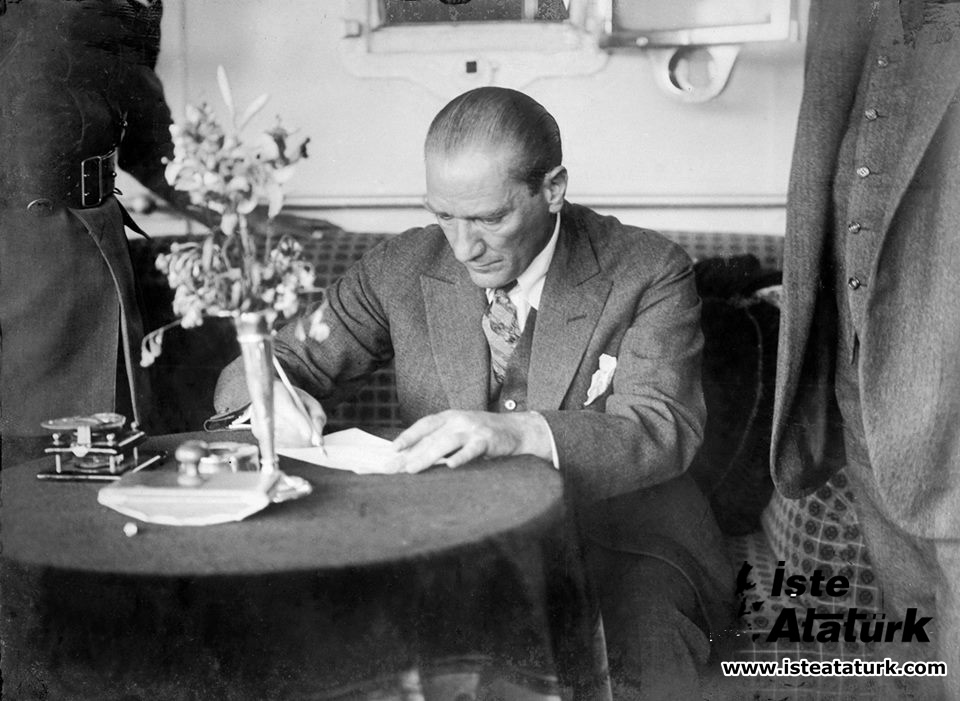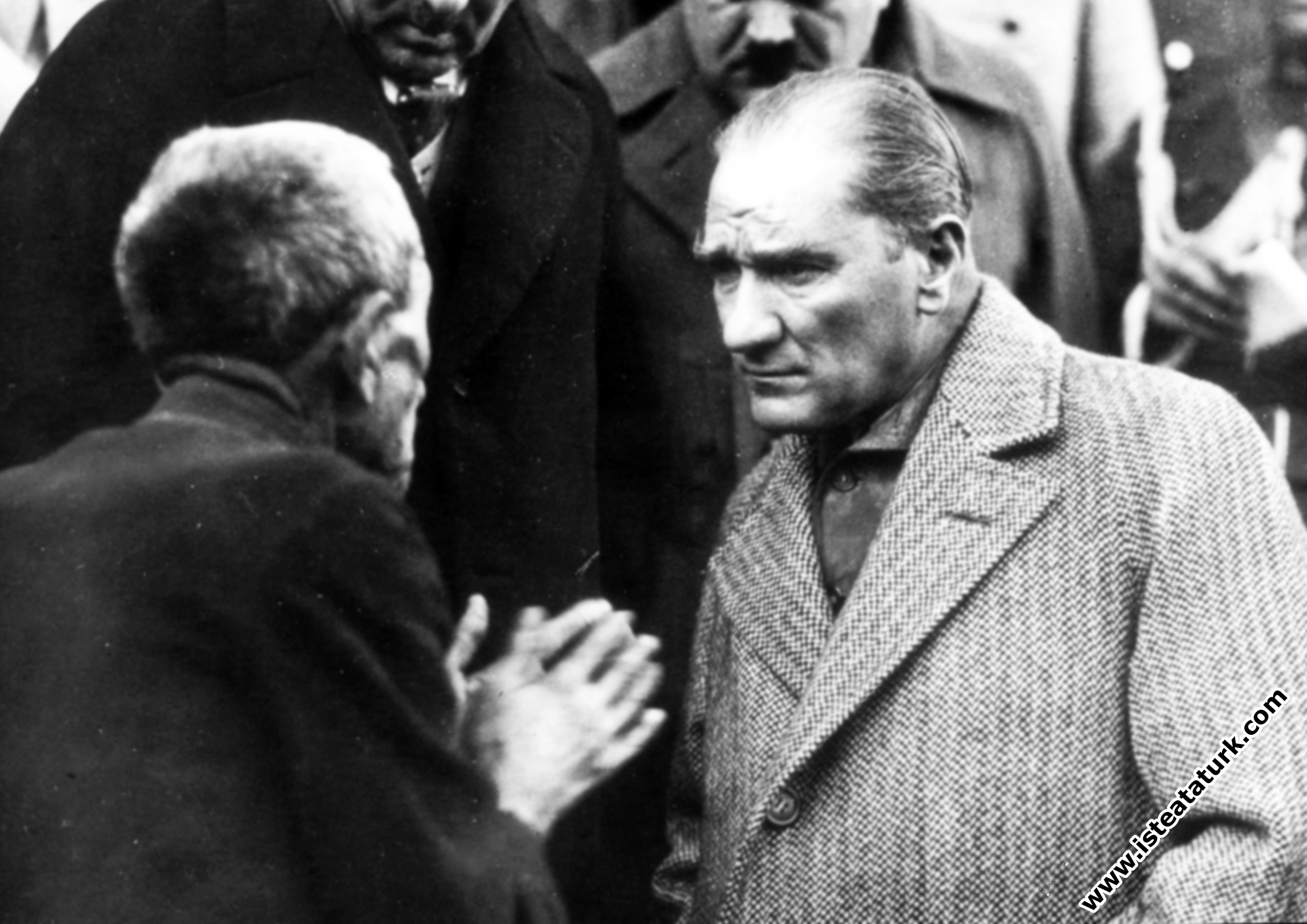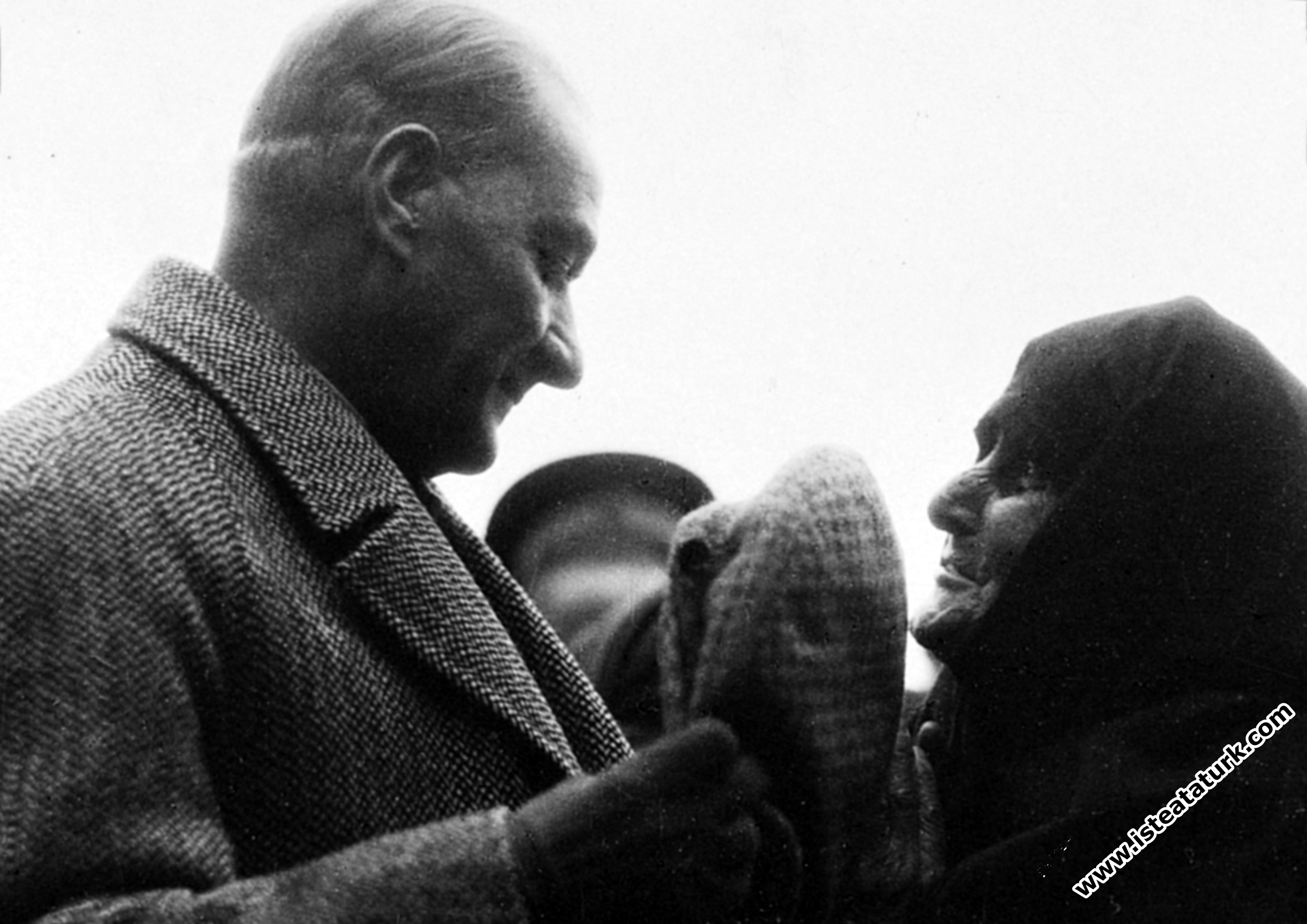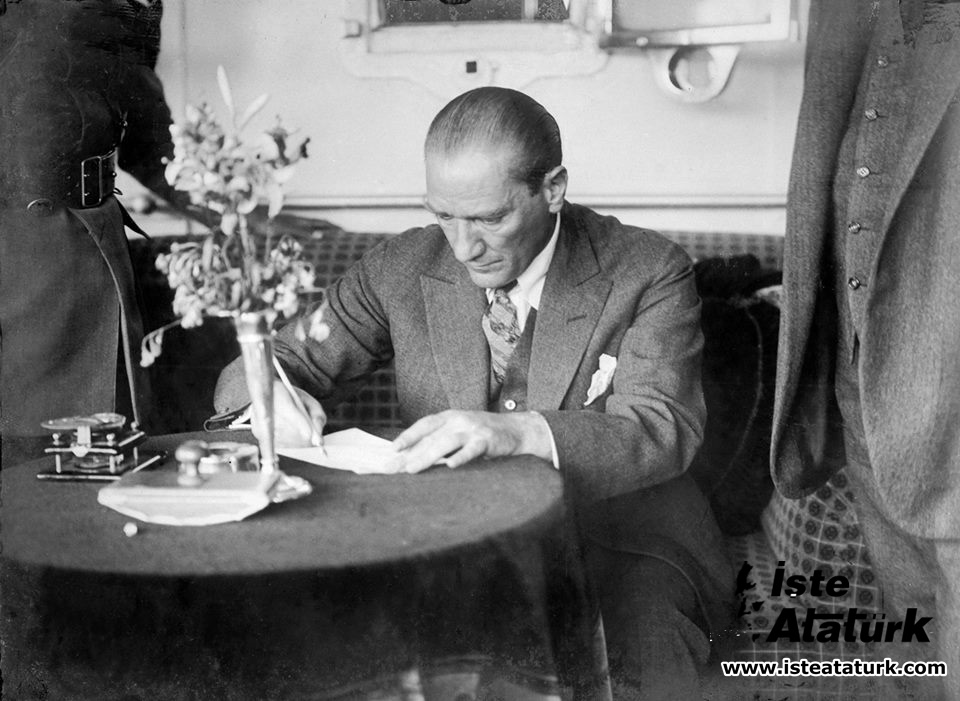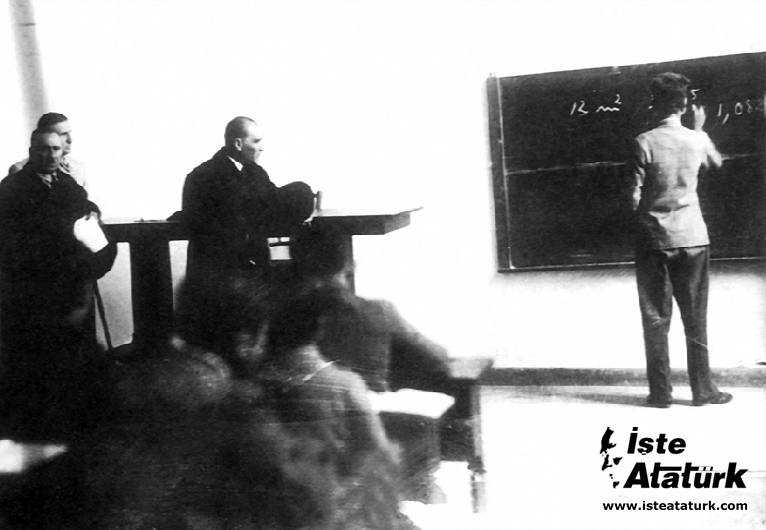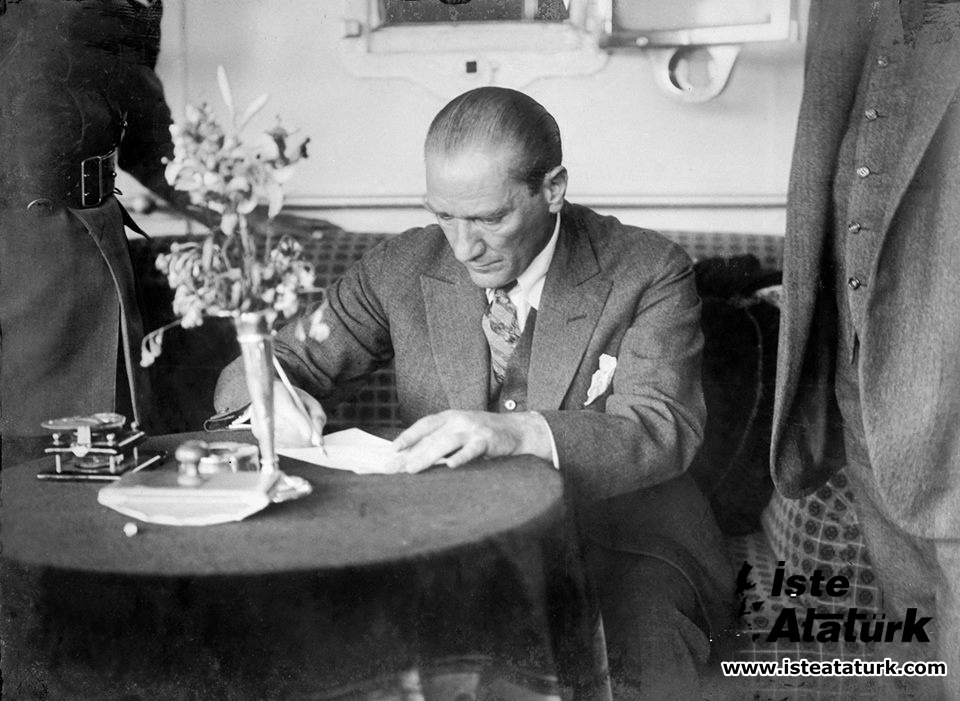
Atatürk's Understanding of Statism
Character Size
"The 'moderate statism principle', which we consider appropriate, is not a system that does not allow private and individual economic initiatives and activities, such as collectivism or communism, based on the principle of socialism, which pursues the aim of arranging the nation on completely different principles by taking all means of production and distribution from individuals." . Mustafa Kemal Atatürk
ATATÜRK'S APPROACH OF STATISTICS
The Ottoman Empire, which was unaware of the Industrial Revolution that took place in Western Europe and the social changes as a result of economic developments, therefore, while regressing from its lands in Europe, quickly became economically independent and in the XIX. Ottoman crafts, which suddenly encountered European industry in the 19th century, were also rapidly consumed.1
Except for the traditional war industry, but in the XIX. In the Industrial Statistics for the years 1913 (1329) - 1915 (1331) published in 1917, the empire, which actively participated in the economy in the mid-century, showed that while 239 of the 252 existing enterprises were operational in 1913, only 182 of the 264 enterprises established in 1915. was still operating. Only 60 of these 264 enterprises were in the hands of the state and Turkish nationals.2
While investigating the reason for the collapse of the Ottoman Empire, Mustafa Kemal underlined that the Ottoman Empire collapsed due to the economy and therefore the Republic had to be an “economic state” in order to survive.3
In the eyes of all the civil and military founders of the Republic, the economy is one of the most fundamental problems concerning the survival of this new state. For example, Celâl Nuri İleri, who made a great contribution to the newly established Republic of Turkey with his ideas and thoughts after Ziya Gökalp, said, “The final victory of the revolution, the final conquest of the Turkish nation and the provision of the position it wants to acquire within the general civilization is uncertain under one condition, which is Wealth in the literal sense, even in the literal sense, is material and legitimate wealth”4 and when comparing the economic structure of Turkey with that of Europe, “economics has a centuries-old tradition in Europe and America. Commercial relations cannot be created in a day. Especially industry is a matter of tradition, capital, science and business. Even agriculture has long since come out of primacy. (... ) I wonder if we can show a company, a fortune, not a company that has been going on for a hundred years? In a country where commerce has become the norm, the son of a skilled tradesman brings his deceased father's trade to life (...) In our country, let alone the presence of merchants, hornbills, and craftsmen, even the number of carpenters, carpenters, blacksmiths, goldsmiths, and jewelers is far from sufficient for the need. Greeks, Armenians and Jews used to perform these arts, which were once considered despicable. They are no more now. The Turkish community is going through a crisis because of the scarcity of virtuous people”5. Even the number of blacksmiths and jewelers is far from being sufficient for the needs. Greeks, Armenians and Jews used to perform these arts, which were once considered despicable. They are no more now. The Turkish community is going through a crisis because of the scarcity of virtuous people”5. Even the number of blacksmiths and jewelers is far from being sufficient for the needs. Greeks, Armenians and Jews used to perform these arts, which were once considered despicable. They are no more now. The Turkish community is going through a crisis because of the scarcity of virtuous people”5.
Under these conditions described by Celâl Nuri Bey, great economic and social problems awaited the Turkish nation, who had won the National Struggle. For this reason, very important decisions were taken in the Turkish Economy Congress convened on 17 February-4 March 1923 in İzmir by the order of Mustafa Kemal Atatürk. While stating the importance of economy in state life in this congress, Mustafa Kemal Atatürk says:
“National sovereignty should be reinforced by economic sovereignty. Such great goals, such sacred and lofty goals cannot be achieved with general rules written on paper, and with commands based on desires and ambitions. In order to make these happen as a whole, the only force is the strongest foundation, the economic force.
No matter how great the political and military victories are, if they are not crowned with economic victories, the achievements will not survive and will fade in a short time”.6
Mustafa Kemal stated that real salvation will be achieved with economic sovereignty. With the signing of the Lausanne Peace Treaty on July 24, 1923, a new phase was initiated, and the peace achieved and the new political order established with the proclamation of the Republic prepared the environment for the economic gathering and development measures to be taken. Thereupon, in the decisions taken at the Izmir Economics Congress, the liberalism suggested by the weak industrialist and merchant section of Istanbul, which was the most organized group of the congress and dragged other groups, even political cadres, was adopted. All layers of society represented in this congress expressed the issues that should be implemented from their own perspective. The prevailing issue in the congress was that the economy would run within its own rules and that the state would not interfere in any way. However, the state should provide support to various organizations operating in economic life, but this support should in no way limit their activities in the free market order. It is known that the basic idea of Istanbul Industrialists and Traders is in this direction. For this purpose, extensive incentive measures were taken and implemented. In order to meet the credit needs of the private sector, the establishment of Türkiye İş Bankası in 1924 and the enactment of the Encouragement-i Industry Law in 1927, leaving the management of nationalized foreign companies and institutions inherited from the Ottoman Empire to the private sector were all indicators of this economic policy. For example, salt monopoly to a local joint stock company, oil and gasoline monopoly to Standard Oil of the USA, match monopoly to another American company, Alcohol and spirits monopoly was contracted to a Polish company. The Encouragement-i Industry Law enacted in 1927 clearly shows what kind of policy the Republican administration followed in favor of the private sector during these years.7
In fact, the basic provisions of the Treaty of Lausanne prevented the state from intervening in the economy on a large scale. An example of this is the provision that obliges customs duties to be kept at the pre-World War I level until 1929. The founders of the Republic benefited from the experience and criticisms of Keynes while giving the Western Countries an economic assurance based on liberal thought in terms of economic policy. In fact, it is interesting that the famous work of Keynes, translated by Fethi Okyar Bey, was officially published by the Ankara Government before he attended the Lausanne Peace Meetings. The official publication of this book in Turkey, shortly after it was published in England, may lead us to think that the delegation to the peace talks benefited from the views in this book.
The great economic earthquake caused by the 1929 World Economic Depression caused the liberal economic thought to be shaken. Even the circles that were strictly adhered to the economic rules of liberalism until those days began to express their doubts on this issue and attempted to seek various ways out. Despite the wide privileges granted to the private sector, especially to industrialists, in the past years, no significant progress has been made in the way of industrialization, on the other hand, a commercial activity with a predominant speculation aspect has been maintained by taking advantage of low customs tariffs. In addition, due to the scantiness of the primitive capital accumulation in the private sector and the scarcity of technical and economic knowledge in the Republican Turkey in this period, despite the advantages provided by the Encouragement-i Industry Law,
Here, as a result of the great economic crisis that started in the USA in 1929 and soon affected Turkey as well as Europe, some of the restrictions brought by the Lausanne Peace Treaty were lifted and the economic guarantee given to the Western countries based on liberal thought was abandoned, liberalism. Instead, it enabled the adoption and implementation of the statism policy. Thereupon, at the 3rd Congress of the CHP held on May 17, 1931, Statism was accepted as a party principle, in addition to Secularism and Revolutionism.8
Atatürk's Understanding of Turkish Statism is expressed as follows in the book titled "Civil Information for Citizens and Mustafa Kemal Atatürk's Manuscripts" published by Afet Inan: It is actively concerned, especially in the economic field, in the affairs that are necessary for the general and high interests of the nation in order to bring prosperity and the country to prosperity”.9
In a written statement, Atatürk expresses his understanding of Turkish Statism in a way that leaves no room for misinterpretations as follows: “The 'moderate statism principle', which we consider appropriate to be applied, is based on the principle of socialism, which follows the aim of arranging the nation on completely different principles by taking all the means of production and distribution from individuals. It is not a system that does not allow private and individual economic enterprise and activity like based collectivism or communism.”10
“The statism system implemented by Turkey is not a system that has been translated from the ideas put forward by the socialist theorists since the nineteenth century. This is a system unique to Turkey, born out of Turkey's needs. In our opinion, the meaning of statism is as follows: To base the private initiatives of individuals; but taking into account all the needs of a great nation and that many things are not done, it is to take the economy of the country into the hands of the state. The State of the Republic of Turkey wanted to do things that have not been done by individual and private initiatives in the Turkish homeland for centuries… The path we follow is a different path than liberalism.”11
Here, the statism that Mustafa Kemal Atatürk declared on various occasions necessitated the planned economy. As a result of this, the Republic of Turkey entered the mixed economy period in 1933 by adopting certain systems decisively. Thus, the First Five-Year Industrial Plan was adopted. The main objective of the plan was to meet the need for flour, sugar and white cotton fabrics, which are called three whites and almost all of which are met through imports, through domestic production.
Within the framework of this plan, with the Sümerbank Law and the law enacted in 1935, the establishment of Etibank12, the establishment of the General Directorate of State Forests in 1937 and finally the National Protection Law enacted on January 18, 1941 at the beginning of the Second World War, the weight of the state in the economy gradually increased and systematized. . The Democratic Party, which came to power with the promise of liberal policy, left this law in effect. This law was only abolished on September 16, 1960.13
It is possible to list some of the functions of statism in the newly established Republic of Turkey as follows.
1- In the first 20 years of the Republic, State Enterprises “accelerated and expanded the Westernization process”.
2- The employment of a significant part of the wage-worker segment, whose number has increased with a limited industrialization process, in state enterprises has created a worker segment that identifies itself to some extent with the established order.
3- State Enterprises also served as educational institutions that train “Contemporary Citizens”.
4- Workers working in the state sector were generally given higher financial opportunities than the private sector until the 1970s. In return, the political silence expected from this group of workers has been. As a matter of fact, after 1960, the period when unionism services accelerated in Turkey, state enterprises did not keep up with this mobility and Türk-İş Union, which generally took a stance in favor of the political order in the 1970s, maintained its superiority in the number of workers.
5- Retired cadres, whose political loyalty has been proven, were re-employed in the boards of directors of State Enterprises, and the trivets of the political power in these institutions were formed.
6- It is seen that the employment of surplus workers in state enterprises is carried out by taking into account the political balances during depressions and periods of increased unemployment.
With the expansion of State Enterprises across the country, it has accelerated the delivery of infrastructure services such as electricity, road and communication to these regions.
As a result, the understanding of statism applied in the economy between 1930-1980 played an important role in the establishment of the Republican Regime in Turkey; however, XXI. At the turn of the century, it can be said that statism has completed its function. Because the founder of the Republic, Mustafa Kemal was a revolutionary and his aim was to bring Turkish society to the level of contemporary civilization. Here, in today's shrinking world, the Market Economy is seen as the most ideal economic model for the Republic of Turkey.
1 Hüseyin Avni - Halit Güleryüz, The Development of Industry in Turkey, Istanbul, 1937, p. 7-12.
2 Selahaddin Özmen, “The State in Production: State-Owned Enterprises”, Turkish Encyclopedia of the Republican Era, (hereinafter as CDTA), 2, 427-428; See also Yaşar Semiz, “Atatürk's Economic Policy, An Overview of the Post-1830 Socio-Economic Structure of the Ottoman Empire”, Erdem, Atatürk Cultural Center Journal, Atatürk Special Issue, 4/12, (Ankara 1988), p. 733-762.
3 Ahmet İnsel, Anatomy of Statism, CDTA, p. 2,419.
4 Celâl Nuri (Advanced), Turkish Revolution, Suhulet Library, 1926, p. 219.
5 Ibid., p. 224-225.
6 Afet İnan, The Principle of Statism and the First Industrial Plan of the Republic of Turkey, 1933, Ankara 1972, p. 42.
7 Selahattin Ozmen, agm, p. 430.
8 Selahattin Ozmen, ibid, p. 431.
9 Afet Inan, supra, p. 23.
10 Utkan Kocatürk, Atatürk's Ideas and Thoughts, Ankara 1969, 214; See also Kemalism (First Book), Ankara 1982, p. 37.
11 Ibid., p. 113.
12 Apart from these, for other banks established in the first years of the Republic, see. A. Gündüz Ökçün, “Banks Established as Joint Stock Companies between 1909-1930”, Turkish Economic History Seminar Texts / Discussions 8-10 June 1973, Ankara 1975, p. 409-535.
13 Selahattin Ozmen, agm, p. 431
Assoc. Dr. Hasan Yuksel *
* Faculty Member of Cumhuriyet University, Faculty of Arts and Sciences, Department of History
Source: ATATÜRK ARAŞTIRMA MERKEZİ DERGİSİ, Sayı 35, Cilt: XII, Temmuz 1996
